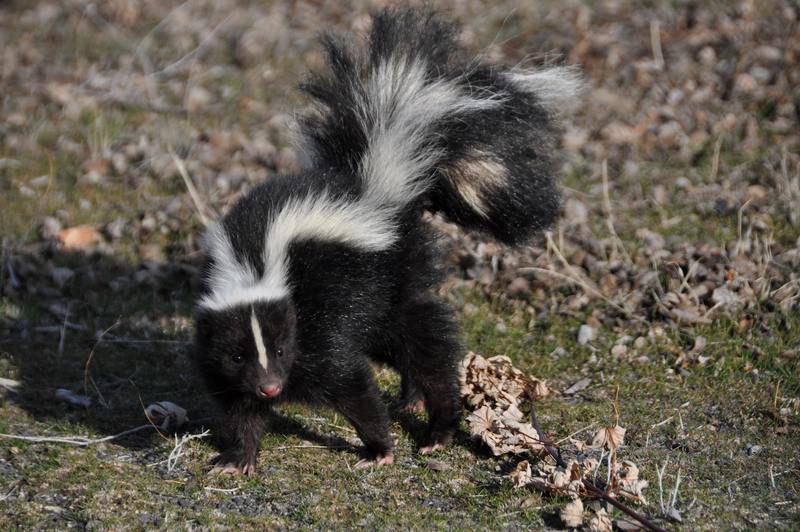Knowing what type of mold smells like skunk and other odors will help you identify the source of the stench and determine what you need to do to get rid of it. Although mold rarely smells like a skunk’s spray, it can often smell similar to being earthy.
Although there are numerous species of mold, none of them specifically produce a unique odor or smell reminiscent of a skunk spray. Even so, learning more about the smell of skunks and mold will allow you to act quickly to get rid of the pungent stench. Continue reading to learn everything there is to know about the molds that can smell like skunks.

What Kind Of Mold Smells Like A Skunk?
A skunk’s smell is recognizable, especially during the summer. In general, a skunk’s smell is not that bad as it smells earthy. Sometimes, people have described the odor to be reminiscent of strong coffee.
However, in stronger, more concentrated sprays, a skunk can smell anywhere from rotting eggs and onions to ammonia, burning rubber, or a gas leak. Although no specific type of mold will ever smell like burning rubber, they will all smell earthy.
All types of mold can have an earthy, musty, and damp stench. The pungent odor is often compared to a pair of wet socks or rotting wood. Although possible, it is rare for mold to produce an odor of rotting eggs like a skunk’s spray.
The difference in the odors of skunks and mold can be traced to its source. Mold odors come from compounds released into the air called microbial volatile organic compounds (mVOCs), while a skunk’s pungent smell is made of a sulfur-based organic compound called thiols. Despite having major differences in their origin and range of smell, both smells can cause symptoms such as nausea and headaches.
Possible Causes Of Skunk Smell In Your Home
If you notice the pungent odor of a skunk in your home, you cannot immediately blame a mold infestation. You might be dealing with an actual skunk spray that was blown by the wind into your abode.
Until you confirm that it is an actual skunk spray, refrain from opening or closing light bulbs, using electronics, or doing anything that causes sparks or flames because a gas leak can also smell like the nauseating stench of a skunk.
Septic gas can also smell a lot like skunk spray. Hydrogen sulfide coming from your sewage pipes can smell similar to rotten eggs or skunks and can cause the same symptoms.
Although a skunk spray lingers for a long time, you can manage the odors using household products. However, if you suspect a gas or sewage leak, it would be best to contact 911, your utility company, or plumbers immediately.
What To Do When You Smell Mold In Your Home?
Step #1. Look for the source
When you smell a musty odor or a skunk spray, it would be best to immediately look for the source. Finding the source of the odor will help you quickly determine if there is a mold infestation occurring in your home.
Usually, you will see visual signs of mold growth before you even smell it. However, some people’s senses of smell are more sensitive than others. If your family member smells a musty odor and you don’t, do not immediately dismiss it as nothing.
When you detect an odor, it would be best to search damp areas and your pipes. As everyone knows, mold loves damp wood or soaked rugs, so your best bet would be to look for previously flooded areas, bathrooms, the laundry room, and the basement.
If your carpet recently got wet due to flooding or spills, then it might be growing mold underneath. To solve that problem, here is a complete guide on the three best products to use to kill mold and mildew in your carpet.
Step #2. Clean up the mold
Once you spot the source, you will have to act fast to inhibit the spread. It would be best to wear protective gear such as masks, rubber gloves, and protective goggles before handling and cleaning up mold.
There are multiple ways to deal with mold. You can use special solutions sold in markets or even simple materials such as bleach or a solution of vinegar and baking soda.
If you trace the smell to your attic, you may have to follow specific steps to prevent the mold from spreading to other places in your home. Here is a guide on how to remove mold from attic plywood.
Step #3. Fix any water leaks
Mold often grows because of leaky pipes and roofing. Now that the mold is gone, you should proceed to fix the source of the water damage to prevent other infestations in the future.
Conclusion
The question of what type of mold smells like skunk may be the wrong question to ask since all types of mold will only produce the smell of rotting eggs under the right conditions. However, knowing what skunks and mold smell like will help you discern the source of the disagreeable stench and act accordingly to remove it, protecting you and your family from possible adverse health effects.
